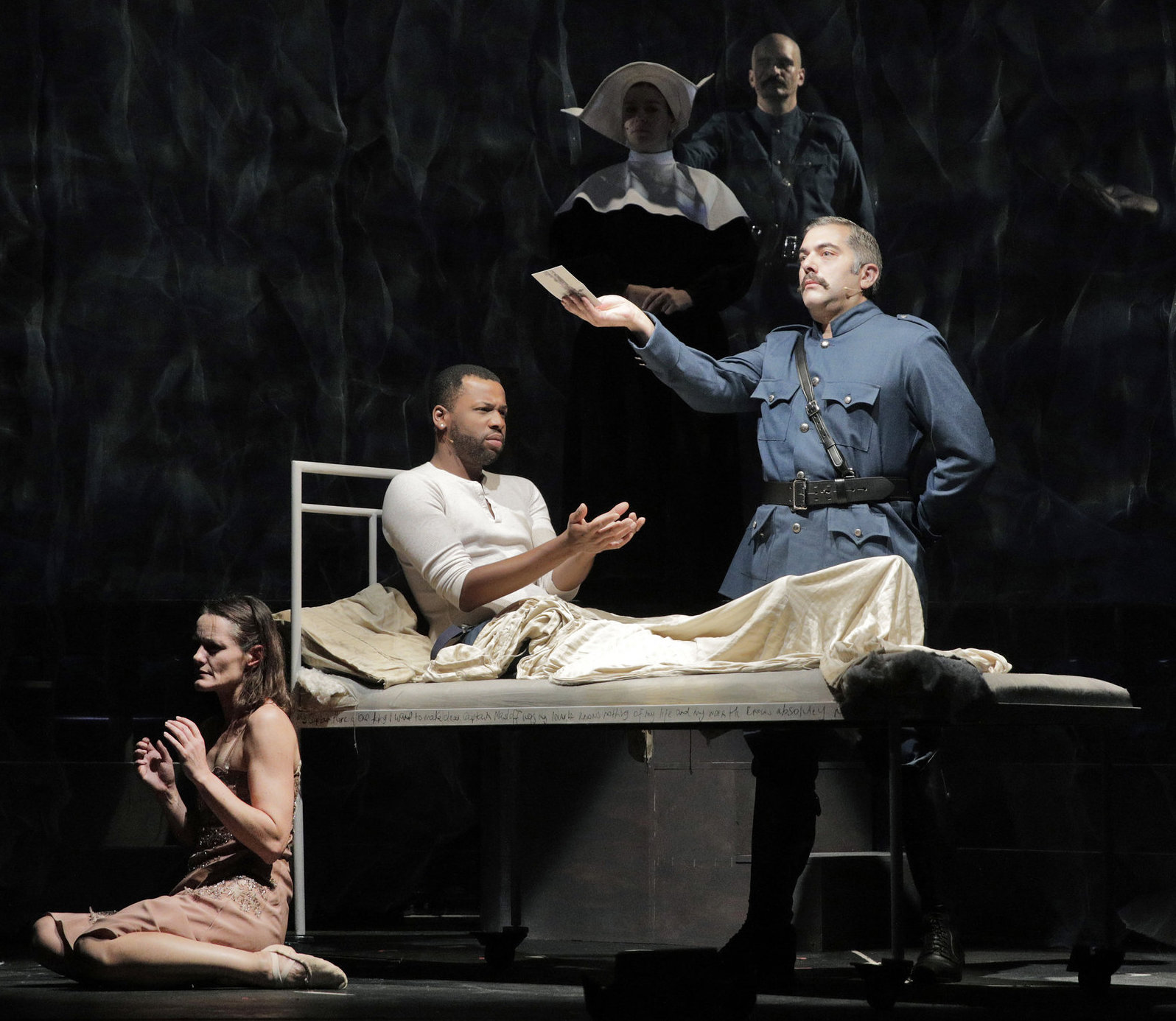Always open to radically new and contemporary writing, West Edge Opera opened its second production of the season this past Sunday with the 2017 opera by Matt Marks and Paul Peers, Mata Hari. The opera, which premiered at New York’s Prototype Festival, combines spoken voice with classical singers. At the Craneway Conference Center, West Edge Opera’s current venue, Emily Senturia conducted the opera’s four-member instrumental ensemble of violin, piano, accordion and electric guitar.

Not such a surprising grouping considering the composer. Matt Marks, who died this past year from heart failure at the age of 38, was one of the founders of the fabulous Alarm Will Sound, an ensemble that came out of the Eastman School of Music, first hitting the concert stage in 2001. With a focus on contemporary classical music, the ensemble grew famous not only for its virtuosity but also for its willingness to slide through myriad genres and have it all hang together, brilliantly.
The same could be said for Marks’ composition, and certainly can be said for the opera, which opens with a driving electronic pulse preceded by beautiful male choral harmonies and continues on exuberantly through various and unpredictable music genres, reconfigured.
Paul Peers’ libretto looks at the life of Margaretha Zelle, the Dutch dancer known as Mata Hari who was executed in 1917 as a German spy by the French government. Provocative and exotic, she had posed as a Javanese princess in her stage act, and garnered herself a string of admirers and lovers across borders and governments. France had paid her to spy on the German Crown Prince, and she confessed to taking money from a German diplomat for trivial political information.
Was she a counterspy? Or was she just a rather ineffectual spy the French wanted to rid themselves of? Or, also possible, was she simply a woman whose flagrant sexuality made her the target of disapproving and prurient officials?
All these points of view rise and fall in the intricate text of the opera, in a series of confessional backflashes Mata Hari makes to the hard-nosed nun who acts as her jailor and confidante while she is in prison, waiting for execution. Like Mata Hari herself, it’s impossible to sort the real from the contrived.
Besides Sister Léonide, sung by Molly Mahoney, and Mata Hari, spoken by Tina Mitchell, the casts consists of five male singers who take on the roles of her lovers, her prosecutor and her dead son. Daniel Cilli, Nikolas Nackley, Michael Grammer and Daniel Yoder moved and sang with precision and fortitude. And Jean-Paul Jones put in an attractive performance: first as Vadime, the man Mata Hari called the love of her life, and then as the Spirit of Norman, Mata Hari’s dead son. Jones moved effortlessly between registers, adopting a soprano range for Norman. The role of Vadime had a popular, at times jazz singer quality.

The one problem of the production was that Mitchell was mic-ed, which required everyone to be amplified in order to keep the soundscape consistent, even though none of the singers needed amplification. To my ear, the sound system was turned too high, forcing Mitchell’s voice, in particular, into shrillness, rather than resonance. Mitchell herself is not very sexually charismatic on stage, and the sound system didn’t help. Though perhaps it served another purpose in changing the focus of the drama.
Several times during the performance, feedback overlapped with the singers as they moved around the stage. Call me old-fashioned, but I like to hear voices in all their natural vibrance, without the resonance, or the distortion, added by electronics. With a different approach to the sound system this can be more subtly achieved.
The staging was stylishly done by Paul Peers, with choreography by Jill Breckenridge. And the set design by Neal Wilkinson featured yards of iridescent, transparent fabric, across which images and videos by David Palmer flowed vibrantly.
West Edge Opera: always interesting, always worthwhile.
– Jaime Robles
West Edge Opera presents Mata Hari again on August 10 and 18 at the Craneway Conference Center in Richmond.
For information and tickets visit westedgeopera.org.
